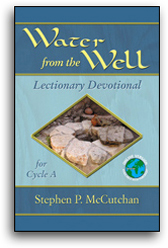Easter 3
Devotional
Water From the Well
Lectionary Devotional For Cycle A
Object:
Now that you have purified your souls by your obedience to the truth so that you have genuine mutual love, love one another deeply from the heart.
-- 1 Peter 1:22
The people to whom Peter wrote were living as resident aliens in a foreign land. There was an uneasiness in such a situation. You were always on edge because you knew that you were different from the dominant culture and could be the object of prejudice at any given moment. Peter reminded them that though they were living in a culture that was foreign to them, that culture was not outside of the awareness of God. "If you invoke as Father the one who judges all people impartially according to their deeds, live in reverent fear during the time of your exile." In one sense, all Christians live as resident aliens regardless of our situation. Because our loyalty is finally with Christ, there is always a certain tension between what we believe and the values of the culture around us. Within that tension, we are to live with a certain respect for others around us because they will judge us according to how they see us living.
Peter tells us that God "judges all people impartially according to their deeds." The paradox of faith is that we are saved by grace but judged by our deeds. While our deeds do not save us, they are important as part of our testimony for God. If it is through Christ that "we have come to trust in God," it is also through Christ that we discover how important our deeds really are. Peter suggested that Christ purified our soul through obedience to the truth that enables us to have genuine, mutual love. Through Christ we experience God's love for us that heals us and sets us free to love one another. We are urged to "love one another deeply from the heart." The heart, as the Bible speaks of it, is not just the seat of our feelings but the very center of our character and decision-making process. We are saved by grace, but we live that salvation by demonstrating a character of love in our relationships with others.
-- 1 Peter 1:22
The people to whom Peter wrote were living as resident aliens in a foreign land. There was an uneasiness in such a situation. You were always on edge because you knew that you were different from the dominant culture and could be the object of prejudice at any given moment. Peter reminded them that though they were living in a culture that was foreign to them, that culture was not outside of the awareness of God. "If you invoke as Father the one who judges all people impartially according to their deeds, live in reverent fear during the time of your exile." In one sense, all Christians live as resident aliens regardless of our situation. Because our loyalty is finally with Christ, there is always a certain tension between what we believe and the values of the culture around us. Within that tension, we are to live with a certain respect for others around us because they will judge us according to how they see us living.
Peter tells us that God "judges all people impartially according to their deeds." The paradox of faith is that we are saved by grace but judged by our deeds. While our deeds do not save us, they are important as part of our testimony for God. If it is through Christ that "we have come to trust in God," it is also through Christ that we discover how important our deeds really are. Peter suggested that Christ purified our soul through obedience to the truth that enables us to have genuine, mutual love. Through Christ we experience God's love for us that heals us and sets us free to love one another. We are urged to "love one another deeply from the heart." The heart, as the Bible speaks of it, is not just the seat of our feelings but the very center of our character and decision-making process. We are saved by grace, but we live that salvation by demonstrating a character of love in our relationships with others.


